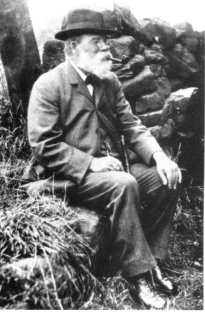Joseph Wright (linguist)
| Joseph Wright | |
|---|---|

Joseph Wright
|
|
| Born | 31 October 1855 Idle |
| Died | 27 February 1930 (aged 74) |
| Academic work | |
| Main interests |
Germanic languages English dialects |
| Notable works | English Dialect Dictionary |
| Influenced | J. R. R. Tolkien |
Joseph Wright FBA (31 October 1855 – 27 February 1930) was an English philologist who rose from humble origins to become Professor of Comparative Philology at Oxford University.
Wright was born in Idle, near Bradford in Yorkshire, the second son of Dufton Wright, a woollen cloth weaver and quarryman, and his wife Sarah Ann (née Atkinson). He started work as a "donkey-boy" in a quarry at the age of six, leading a donkey-drawn cart full of tools to the smithy to be sharpened. He later became a bobbin doffer – responsible for removing and replacing full bobbins – in a Yorkshire mill in Sir Titus Salt's model village. Although he learnt his letters and numbers at the Salt's Factory School, he was unable to read a newspaper until he was 15. He later said of this time, "Reading and writing, for me, were as remote as any of the sciences".
By now a wool-sorter earning £1 a week, Wright became increasingly fascinated with languages and began attending night-school to learn French, German and Latin, as well as maths and shorthand. At the age of 18 he even started his own night-school, charging his colleagues twopence a week.
By 1876 he had saved £40 and could afford a term's study at the University of Heidelberg, although he walked from Antwerp to save money.
Returning to Yorkshire, Wright continued his studies at the Yorkshire College of Science (later the University of Leeds) while working as a schoolmaster. A former pupil of Wright's recalls that, "with a piece of chalk [he would] draw illustrative diagrams at the same time with each hand, and talk while he was doing it".
He later returned to Heidelberg and in 1885 completed a PhD. on Qualitative and Quantitative Changes of the Indo-Germanic Vowel System in Greek.
In 1888, after his return from Germany, Wright was offered a post at Oxford University by Professor Max Müller, and became a lecturer to the Association for the Higher Education of Women and deputy lecturer in German at the Taylor Institution.
...
Wikipedia
